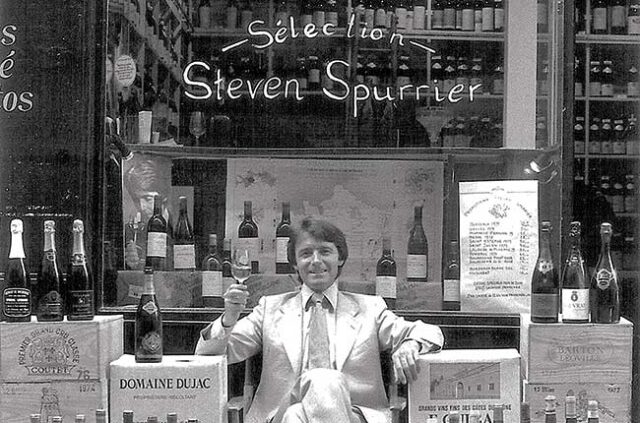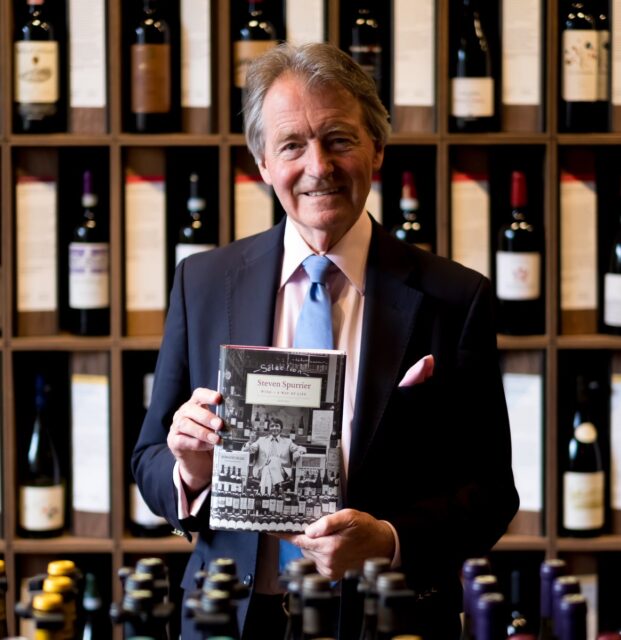This website uses cookies so that we can provide you with the best user experience possible. Cookie information is stored in your browser and performs functions such as recognising you when you return to our website and helping our team to understand which sections of the website you find most interesting and useful.
Wine trade pays tribute to Steven Spurrier
Tributes have been pouring in from around the world for wine trade luminary Steven Spurrier, who died at his home in Dorset yesterday aged 79.

A much admired and hugely liked figure in the wine trade, Spurrier began his career as a wine merchant in Paris, and went on to become a successful wine writer, educator, and most recently winemaker at Bride Valley in Dorset.
Spurrier famously organised The Judgment of Paris tasting 1976, when California wines unexpectedly trumped top French labels in a now legendary blind tasting that helped to put wines from the Golden State on the map.
The story was turned into a film called Bottle Shock in 2008, starring the late Alan Rickman as Spurrier, who missed the mark when he played Steven as an uptight and snooty Brit, when Spurrier was known for being quite the opposite.

“I loved his enthusiasm and open mind. He treated all wines as equals,” Tim Atkin MW said on Twitter yesterday, while Robert Joseph described him as “a gentle man and a gentleman. Steven was one of the people who can undeniably be said to have helped to change the wine world for the better”.
One of the many winemakers paying tribute to Steven yesterday was Bo Barrett of Château Montelena, whose 1973 Chardonnay came out top in the Judgement of Paris tasting, helping to propel the estate to international fame.
“Steven’s now famous Judgement of Paris in 1976 is recognised as a catalytic moment in Napa Valley and Montelena’s history. His contribution was instrumental to setting us up for success.
“Not only Montelena and Napa – that one historical event set up a chain of circumstances that levelled the playing field for any great wine, from any place in the world, to walk onto the big league,” Barrett told db.
Guy Woodward, who worked closely with Steven while he was editor of Decanter magazine, praised Spurrier’s open mind and lack of ego.
“Steven had no ego. He was always concerned not to offend, or to cause controversy for controversy’s sake – not because he was afraid to express his opinion, but because he preferred to focus on the positive. It simply wasn’t his way to find fault. His was a optimistic, generous approach,” Woodward, who is now the content director at Club Oenologique, told db.

“What always impressed me was his unstinting curiosity and open-minded approach to wine. Decanter was a relatively conservative world where some contributors struggled to see beyond Bordeaux. But Steven had kept up with such progress, and revelled in it, championing up-and-coming regions and winemakers as enthusiastically as he did the classics,” he added.
Adam Lechmere, who worked with Spurrier when he was the online editor at Decanter, was impressed by Stevens “encyclopaedic knowledge of wine” and wide range of interests outside of wine, citing art as his “addictive hobby”.
“Wine people can be one-dimensional but Steven had incredibly wide interests. He began collecting art as a teenager and his house in Dorset was packed with sculptures and paintings.
“He had a complete set of Goya’s Tauromaquia, a book by Matisse, dozens of interesting watercolours and oils, and some superb abstract sculptures in the garden. Like a true magpie art lover, he always had a story about where he picked up such-and-such a piece,” Lechmere said.
Many of the tributes to Spurrier mentioned how well dressed and well mannered he was, including Jancis Robnson MW, who said: “He wore his achievements exceptionally lightly – he was always more fired up by the next project than by those of the past. He had the manners of an Old Etonian and debonair was a word made for him.”
db’s editor-in-chief, Patrick Schmitt MW, praised Spurrier’s encouragement of the younger members of the wine trade to pursue their passion. “Along with Spurrier’s unmatched sartorial elegance, I will remember him for his energy, charm, warmth and enthusiasm.
“He was kind to fellow members of the trade, whatever their age and position, and encouraging in his approach to other wine writers, whoever they worked for, and however basic their level of drinks knowledge,” he said.

Wine critic Neal Martin echoed Schmitt’s sentiments: “Steven Spurrier was one of the kindest gentlemen I have had the pleasure to know. He was a great supporter when I was a nobody. His indefatigable spirit to the very end is a lesson to us all.”
Bordeaux-based Jane Anson said that Steven will be remembered for his “kindness and generosity”.
“I owe a huge amount to him professionally, for the kindness and generosity that he showed me, but what is striking is that this is true for so many people, in so many different places across the world,” Anson said.
“The last time I saw Steven was at a dinner we shared with the Opus One team in Bordeaux, held after a book signing for the launch of his memoirs.
“We drank the 1980 vintage in honour of the role that his 1976 tasting played in the founding story of Opus. He was as modest as ever in downplaying his importance, but delighted to see how well the wine was holding up,” she added.
Modest until the end, shortly before his death Spurrier opened up to Jancis Robinson MW about his two greatest passions, aside from his wife Bella and their children, Christian and Kate: “I have loved wine – and art – all my life, and the wonderful people I have been lucky enough to meet and perhaps inspire.”
In one of his last print interviews, Spurrier revealed what he believes to be the secret to a happy life to Club Oenologique: “There are three important things in life: someone to love, something to do and something to look forward to.”

